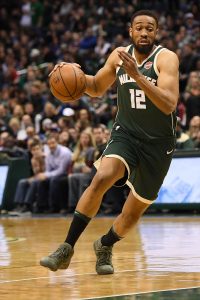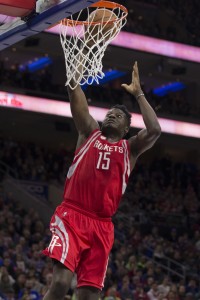The NBA’s rookie scale, which dictates how much first-round picks earn during their first four NBA seasons, also dictates how much the qualifying offers will be worth for those players when they reach restricted free agency after year four. However, the value of those qualifying offers can fluctuate depending on whether or not a player has met the “starter criteria.”
Here’s how the starter criteria works: A player who is eligible for restricted free agency is considered to have met the starter criteria if he plays at least 2,000 minutes or starts 41 games in the season before he reaches free agency. A player can also meet the criteria if he averages either of those marks in the two seasons prior to his restricted free agency. For instance, if a player started 50 games in 2016/17 and 32 in 2017/18, he’d meet the starter criteria, since his average number of starts over the last two seasons is 41.
A player’s ability or inability to meet the starter criteria can affect the value of the qualifying offer he receives as a restricted free agent, as follows:
- A top-14 pick who does not meet the starter criteria will receive a qualifying offer equal to the amount the 15th overall pick would receive if he signed for 120% of the rookie scale.
- A player picked between 10th and 30th who meets the criteria will receive a qualifying offer equal to the amount the ninth overall pick would receive if he signed for 120% of the rookie scale.
- A second-round pick or undrafted player who meets the criteria will receive a qualifying offer equal to the amount the 21st overall pick would receive if he signed for 100% of the rookie scale.
- For all other RFAs, the standard criteria determine the amounts of their qualifying offers.
Extending a qualifying offer to a player eligible for restricted free agency officially makes that player an RFA, ensuring that his team has the right of first refusal if he signs an offer sheet with another club. It also gives the player the option of signing that one-year QO.
Generally, the value of a restricted free agent’s qualifying offer isn’t hugely important, since very few RFAs accept those offers outright. There are exceptions though. Last offseason, for instance, both players who signed their one-year QOs – Suns center Alex Len and Mavericks center Nerlens Noel – failed to meet the starter criteria heading into restricted free agency, reducing the value of their QOs to approximately $4.2MM (from $6.4MM and $5.85MM, respectively). Had Len and Noel met the starter criteria and been eligible for those larger QOs, their free agencies could have played out differently.
Top-14 picks who failed to meet starter criteria:
With that in mind, let’s check in on how this year’s RFAs-to-be will be impacted by the starter criteria. Listed below are the former top-14 picks on track for restricted free agency who have not met the starter criteria. These players will be eligible for qualifying offers worth $4,333,931.
- Jabari Parker (Bucks)
- Dante Exum (Jazz)
- Nik Stauskas (Nets)
- Noah Vonleh (Bulls)
- Doug McDermott (Mavericks)
- Zach LaVine (Bulls)
No player was hit harder by missing out on the starter criteria than Parker, whose torn ACL made him fall short. If he’d stayed healthy, the former No. 2 overall pick likely would’ve been in line for a qualifying offer worth about $8.851MM. Instead, his QO will be worth less than half of that.
Major injuries also prevented Exum and LaVine from meeting the starter criteria, while Celtics guard Marcus Smart stayed just healthy enough to meet the necessary benchmarks — he totaled 4,013 minutes played over the last two seasons, barely averaging more than 2,000 per year.
First-round picks between 10-30 who met starter criteria:
The players listed below were picked between No. 10 and No. 30 in the 2014 draft and will meet the starter criteria. That will make each of them eligible for a qualifying offer worth $4,749,591.
- Elfrid Payton (Suns)
- Jusuf Nurkic (Trail Blazers)
- Clint Capela (Rockets)
- Kyle Anderson (Spurs)
Anderson is the biggest winner here, with his projected qualifying offer of $3.23MM set to increase by more than $1.5MM. However, Anderson, Capela, and Nurkic shouldn’t have any issue landing long-term deals, making the value of their QOs somewhat irrelevant. I wonder about Payton though — he didn’t exactly finish this season strong in Phoenix and could be a candidate to accept his increased QO.
Rodney Hood, the 23rd overall pick in 2014, can blame injury luck and lineup decisions for missing out on the starter criteria. He started 78 of 119 total games for Utah and Cleveland over the last two seasons, averaging 27.0 minutes per contest during that span. Without health issues, he almost certainly would’ve logged 82+ starts or 4,000+ minutes during those two years.
Second-round picks and UDFAs who met starter criteria:
Only one player falls into this group this year.
- Yogi Ferrell (Mavericks)
Initially signed to a 10-day contract in 2017, Ferrell parlayed that audition into a multiyear deal and has become an integral part of the Mavericks‘ rotation this season. He has appeared in all 81 games for Dallas, averaging 28.1 minutes per contest — that’s good for 2,274 total minutes, boosting his qualifying offer from $1,699,698 to $2,919,204.
The rest of this year’s restricted free agents won’t have their projected qualifying offers impacted by the starter criteria.

 Clint Capela
Clint Capela